New Shores - Africa
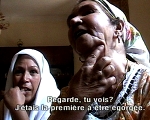 » Guerre sans images/War Without Images, Mohammed Soudani, SWITZERLAND, 2002 90′
» Guerre sans images/War Without Images, Mohammed Soudani, SWITZERLAND, 2002 90′
Algeria’s forgotten civil war continues to escape the headlines. After being absent for thirty years, filmmaker Mohammed Soudani returns to Algeria with photographer Michael von Graffenried in search of the anonymous faces photographed ten years prior. Too many of these faces have since disappeared. Looking back over the images, Soudani comments on the state of his country.
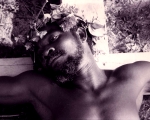 » Au nom du Christ/In the Name of Christ, Roger Gnoan M’Bala, IVORY COAST, 1993 90′
» Au nom du Christ/In the Name of Christ, Roger Gnoan M’Bala, IVORY COAST, 1993 90′
Christianity comes to a little West African village after an outcast swineherd falls into the river and has a vision of a black baby Jesus, who tells him he has been chosen to save his people. Dubbing himself Magloire the First, the swineherd claims to be “the cousin of Christ.” The villagers’ scorn turns to awe when Magloire works some trumped-up miracles — like personally impregnating a “sterile” woman and curing a mad woman possessed by a sorcerer. At first, Magloire’s preaching has the comic edge of social satire. (Why are there rich and poor, good and evil, on the Earth? For balance, he replies.) But as his power grows, so does the evil he perpetrates “in the name of Christ.” In one horrifying scene, he has the childless woman’s husband castrated off-screen. Claiming himself incapable of sin, he sleeps with numerous married women, who then dress like nuns and feed him from their hands.
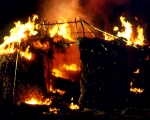 » Adanggaman / Adanggaman, Roger Gnoan M’Bala, IVORY COAST/ BURKINA FASO /FRA/CH/ITA, 2000 90′
» Adanggaman / Adanggaman, Roger Gnoan M’Bala, IVORY COAST/ BURKINA FASO /FRA/CH/ITA, 2000 90′
West Africa in the 17th Century. In a small village the old chief N’go insists that his son Ossei marries the daughter of a rich family. Unable to be with the girl he truly loves, the rebellious Ossei decides to leave the village. That night, Ossei’s village is burned and pillaged. Many are killed, while others are taken prisoner. The bloody massacre is executed by the Amazon warriors of the neighboring tyrant Adanggaman. When Ossei returns to his destroyed village, he discovers that nearly all have been killed. He rushes to search for his missing mother Mo Akassi. Ossei catches up with the captured villagers led by the cruel Amazons on the difficult voyage toward Adanggamen’s kingdom. He finds himself among many men, women and children in chains, humiliated and beaten like pathetic beasts. Adanggamen is filled with joy at the results of his Amazons’ recent manhunt, the inhuman source of his prestige, fortune and power. It is evident that his own kingdom has not escaped the hands of European slave traders by accident.
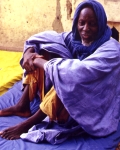 » Waalo Fendo: Là où la terre gèle/Waalo Fendo: where the Earth freezes, Mohammed Soudani, SWITZERLAND, 1997 63′
» Waalo Fendo: Là où la terre gèle/Waalo Fendo: where the Earth freezes, Mohammed Soudani, SWITZERLAND, 1997 63′
Yaro is a young Senegalese who arrives in Italy with the dream of a Western world which can offer him the wealth and future his own country could never guarantee. Two years pass and Yaro writes to his family asking that his younger brother Demba come to Italy where they will be able to live and work together in order to earn more money. After several consultations between the family, the village chief and the villagers, Demba departs for Dakar where he stays until leaving for Italy six months later. A few weeks following Demba’s arrival, Yaro is murdered not far from Milan’s Stazione Centrale. The younger brother wants to find out why, and by whom. With the aid of Theo, a close friend of Yaro’s, and of other immigrants, Demba takes us on a journey to hell, from the smog of Milan to the large tomato plantations of Southern Italy where mafiosi and honest men are often one and the same. Located somewhere between fiction and documentary, Waalo Fendo describes the world of these non-Europeans, where Black Africans, North Africans and other foreigners live together, struggling amongst themselves and against everyone in order to ensure their day-to-day survival.
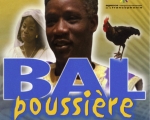 » Bal poussière/Dancing in the Dust, Henri Duparc, IVORY COAST, 1988 91′
» Bal poussière/Dancing in the Dust, Henri Duparc, IVORY COAST, 1988 91′
Traditional African practices of polygamy (among the chiefly class) come in for a ribbing in this feature from the Ivory Coast. “Half-God” (Bakary Bamba) is a chief who acquired that nickname because, to his subjects, only God is more important. Like God, he feels that he should work six days of the week and rest on the seventh. However, he only has five wives. In order for his bedroom activities to follow the divine pattern, he needs a sixth. In an arranged match, the traditional parents of Binta (Hanny Tchelly), a thoroughly modern young woman, hitch her to him. Instead of fitting into his plans, however, she upsets everyone with her modern ways, and they are all quite content to see her run off with a visiting musician, never to be seen again.
harvest| friends| masters| new shores| retrospective- the south of cinema
far east special | special occassion| short films and animation
 » Guerre sans images/War Without Images, Mohammed Soudani, SWITZERLAND, 2002 90′
» Guerre sans images/War Without Images, Mohammed Soudani, SWITZERLAND, 2002 90′
Algeria’s forgotten civil war continues to escape the headlines. After being absent for thirty years, filmmaker Mohammed Soudani returns to Algeria with photographer Michael von Graffenried in search of the anonymous faces photographed ten years prior. Too many of these faces have since disappeared. Looking back over the images, Soudani comments on the state of his country.
 » Au nom du Christ/In the Name of Christ, Roger Gnoan M’Bala, IVORY COAST, 1993 90′
» Au nom du Christ/In the Name of Christ, Roger Gnoan M’Bala, IVORY COAST, 1993 90′
Christianity comes to a little West African village after an outcast swineherd falls into the river and has a vision of a black baby Jesus, who tells him he has been chosen to save his people. Dubbing himself Magloire the First, the swineherd claims to be “the cousin of Christ.” The villagers’ scorn turns to awe when Magloire works some trumped-up miracles — like personally impregnating a “sterile” woman and curing a mad woman possessed by a sorcerer. At first, Magloire’s preaching has the comic edge of social satire. (Why are there rich and poor, good and evil, on the Earth? For balance, he replies.) But as his power grows, so does the evil he perpetrates “in the name of Christ.” In one horrifying scene, he has the childless woman’s husband castrated off-screen. Claiming himself incapable of sin, he sleeps with numerous married women, who then dress like nuns and feed him from their hands.
 » Adanggaman / Adanggaman, Roger Gnoan M’Bala, IVORY COAST/ BURKINA FASO /FRA/CH/ITA, 2000 90′
» Adanggaman / Adanggaman, Roger Gnoan M’Bala, IVORY COAST/ BURKINA FASO /FRA/CH/ITA, 2000 90′
West Africa in the 17th Century. In a small village the old chief N’go insists that his son Ossei marries the daughter of a rich family. Unable to be with the girl he truly loves, the rebellious Ossei decides to leave the village. That night, Ossei’s village is burned and pillaged. Many are killed, while others are taken prisoner. The bloody massacre is executed by the Amazon warriors of the neighboring tyrant Adanggaman. When Ossei returns to his destroyed village, he discovers that nearly all have been killed. He rushes to search for his missing mother Mo Akassi. Ossei catches up with the captured villagers led by the cruel Amazons on the difficult voyage toward Adanggamen’s kingdom. He finds himself among many men, women and children in chains, humiliated and beaten like pathetic beasts. Adanggamen is filled with joy at the results of his Amazons’ recent manhunt, the inhuman source of his prestige, fortune and power. It is evident that his own kingdom has not escaped the hands of European slave traders by accident.
 » Waalo Fendo: Là où la terre gèle/Waalo Fendo: where the Earth freezes, Mohammed Soudani, SWITZERLAND, 1997 63′
» Waalo Fendo: Là où la terre gèle/Waalo Fendo: where the Earth freezes, Mohammed Soudani, SWITZERLAND, 1997 63′
Yaro is a young Senegalese who arrives in Italy with the dream of a Western world which can offer him the wealth and future his own country could never guarantee. Two years pass and Yaro writes to his family asking that his younger brother Demba come to Italy where they will be able to live and work together in order to earn more money. After several consultations between the family, the village chief and the villagers, Demba departs for Dakar where he stays until leaving for Italy six months later. A few weeks following Demba’s arrival, Yaro is murdered not far from Milan’s Stazione Centrale. The younger brother wants to find out why, and by whom. With the aid of Theo, a close friend of Yaro’s, and of other immigrants, Demba takes us on a journey to hell, from the smog of Milan to the large tomato plantations of Southern Italy where mafiosi and honest men are often one and the same. Located somewhere between fiction and documentary, Waalo Fendo describes the world of these non-Europeans, where Black Africans, North Africans and other foreigners live together, struggling amongst themselves and against everyone in order to ensure their day-to-day survival.
 » Bal poussière/Dancing in the Dust, Henri Duparc, IVORY COAST, 1988 91′
» Bal poussière/Dancing in the Dust, Henri Duparc, IVORY COAST, 1988 91′
Traditional African practices of polygamy (among the chiefly class) come in for a ribbing in this feature from the Ivory Coast. “Half-God” (Bakary Bamba) is a chief who acquired that nickname because, to his subjects, only God is more important. Like God, he feels that he should work six days of the week and rest on the seventh. However, he only has five wives. In order for his bedroom activities to follow the divine pattern, he needs a sixth. In an arranged match, the traditional parents of Binta (Hanny Tchelly), a thoroughly modern young woman, hitch her to him. Instead of fitting into his plans, however, she upsets everyone with her modern ways, and they are all quite content to see her run off with a visiting musician, never to be seen again.

